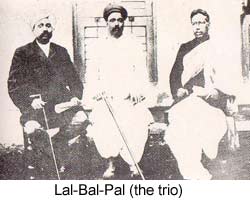

 |  |
 The Lucknow Congress also demanded a further dose of constitutional reforms as a step towards self Government. The increasing popularity of the Home Rule Movement soon attracted the Governments wrath. The Government of Madras banned students from participating in political meetings. The turning point came with the decision of the Government of Madras in June 1917 to place Mrs. Besant and her associates under arrest. Their interment became the occasion for nation wide protest. Those who had stayed away, like Madan Mohan Malviya and Surendranath Bannerji joined the Home Rule League. The Lucknow Congress also demanded a further dose of constitutional reforms as a step towards self Government. The increasing popularity of the Home Rule Movement soon attracted the Governments wrath. The Government of Madras banned students from participating in political meetings. The turning point came with the decision of the Government of Madras in June 1917 to place Mrs. Besant and her associates under arrest. Their interment became the occasion for nation wide protest. Those who had stayed away, like Madan Mohan Malviya and Surendranath Bannerji joined the Home Rule League. At Gandhiji's instance, Shankarlal Banker and Jamnadas Dwarkadas collected the signatures of 1000 men against their detention. Government in Britain decided to effect a change in policy and adopt a conciliatory posture. The new Secretary of the State, Montague, made a historic declaration in the House of Commons 'The policy of His Majesty's Government is that of the increasing association of Indians in every branch of the administration..'. In keeping with the conciliatory stance of the Montague declaration, Annie Besant was released in September 1917. Annie Besant was soon elected the president of Congress in December 1917. During 1918, however, various factors combined to diffuse the energies that had concentrated in the agitation for Home Rule. For one, the moderates who had joined the movement after Besant's arrest were pacified by the promise of reforms and by Besant's release. Soon Tilak also left for England to pursue liable case. Thus the stage was now set for the entry of Mohandas Karamchand Gandhi. next page >> |
Copyright ©2000 indiansaga.info. All rights reserved.
By using this service, you accept that you won't copy or use the data given in this website for any commercial purpose.
The material on indiansaga.info is for informational & educational purpose only.
This site is best viewed at 800 X 600 picture resolution.